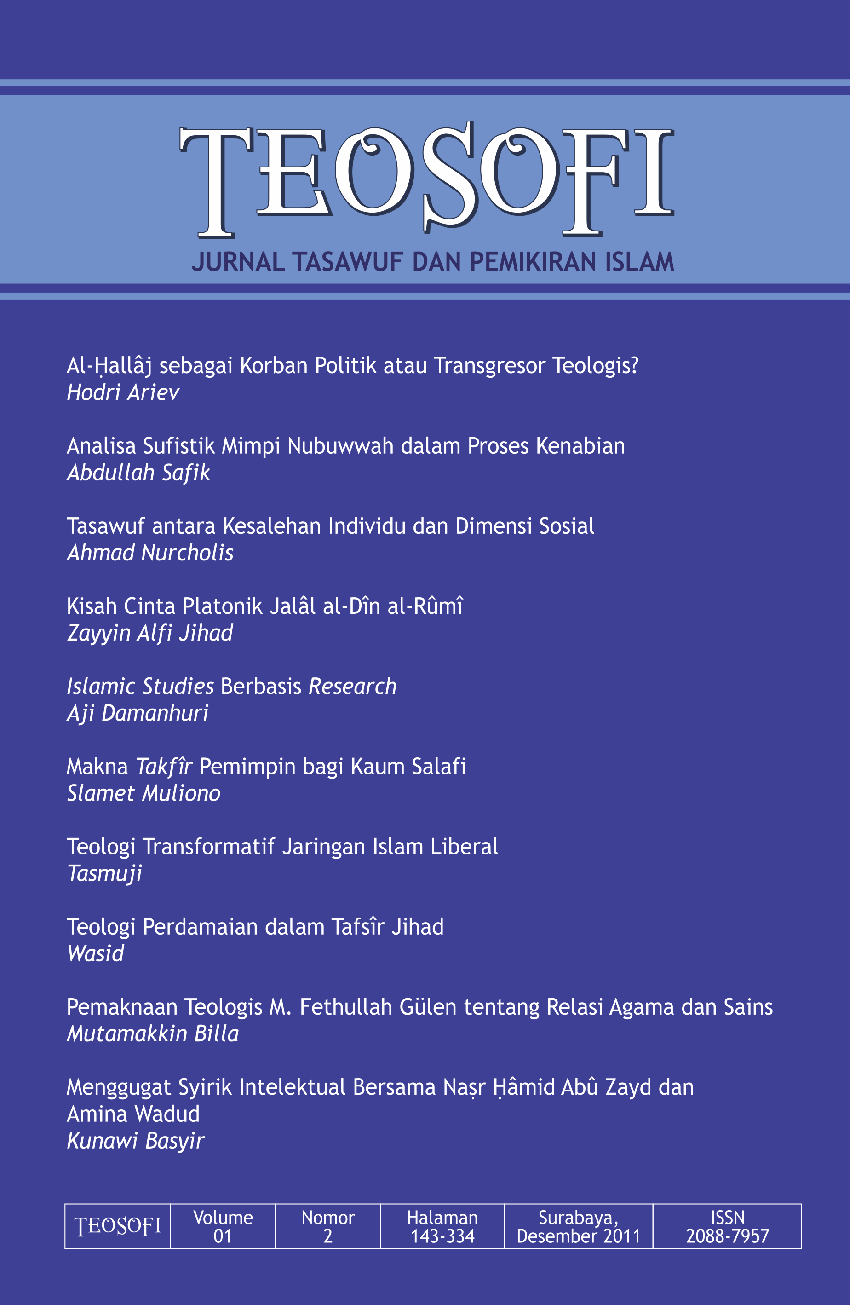Al-Hallâj Sebagai Korban Politik atau Transgresor Teologi
Main Article Content
Abstract
The article attempts to reveal al-Hallâj’s history of thought that caused his death as he was considered an apostate who violated religious boundaries. Moreover, on several occasions, al-Hallâj was made as a sort of warning for those who “cheat” with religious issues will be firmly punished by the death penalty. It has been rarely clarified that Al-Hallâj was, in fact, a political victim by divulging religious issues as the main reason. As a concept, Hulûl, which becomes the main doctrine of al-Hallâj, has been often misunderstood and seen as conduct that leads to apostasy. The reason is that the death penalty executed its founder as he was accused of being an apostate. On the other side, such a view is not quite surprising since the level of understanding held by the majority of Muslims has, in fact, been within khitâbî level. It has caused them hard to properly and correctly understand such philosophical discourses as hulûl, ittihâd, or wahdat al-wujûd. This condition has been worsened by the fact that literature on al-Hallâj and hulûl, especially in the Indonesian language, is rare. After centuries, the idea of hulûl has been frequently misunderstood. However, careful study will show that hulûl, like other Sufi’s doctrines, is Sufism experience expression of al-Hallâj when he felt the presence of God, i.e., the encounter of human’s lâhût with God’s nâsût. Therefore, the execution of al-Hallâj has been based on more political interest than theological reason.
Downloads
Article Details

This work is licensed under a Creative Commons Attribution-NonCommercial 4.0 International License.
Licensing
© The Author(s). Published by Department of Aqidah and Islamic Philosophy, Faculty of Ushuluddin and Philosophy, Sunan Ampel State Islamic University Surabaya, Indonesia.
This is an Open Access article distributed under the terms of Attribution-NonCommercial 4.0 International (CC BY-NC 4.0).
References
Bayat, Mojdeh dan Jamnia, Muhammad Ali. Negeri Sufi: Kisah-kisah Terbaik, terjemahan dari Tales from the Sufi Land oleh M. S. Nasrulloh. Jakarta: Penerbit Lentera, 1997.
Corbin, Henry. History of Islamic Philosophy. London: the Institute of Ismaili Studies, 1993.
B. Lewis, V. L. Manage, Ch. Pellet, dan J. Schacht (eds.). The Encyclopaedia of Islam, New Edition, Vol. III. Leiden: E. J. Brill, 1979.
Eliade, Mircea (ed. in chief). The Encyclopaedia of Religion, Vol. 6. New York: Macmillan Publishing Company, 1987.
Fakhry, Majid. A History of Islamic Philosophy 2nd Edition. New York: Columbia University Press, 1983.
Ferguson, John. An Illustrated Encyclopaedia of Misticism and the Mistery Religion. London: Thames and Hudson, 1976.
Hastings, James (ed.). Encyclopaedia of Religion and Ethics, Vol. VI. New York: Charless Scribner’s Son.
Ghallâb, Muhammad. Al-Tasawwuf al-Muqârin. Kairo: Maktabah Nahdah, t.th.
Hastings, James (ed.). Encyclopaedia of Religion and Ethics, Vol. VI. New York: Charles Scribner’s Son, t.th.
Masignon, Louis. El-Hallaj dalam A History of Muslim Philosophy, buku pertama, M. M. Syarif (ed.), Wiesbaden: Otto Harrassowitz, 1962.
Mason, Herbert W. Al-Hallâj. British Library: Curzon Press, 1995.
Mohammed, Yasien. Insan Yang Suci: Konsep Fitrah dalam Islam, terj. Masyhur Abadi. Bandung: Mizan, 1997.
Munawwir, A. W., Kamis Al-Munawwir Arab-Indonesia Terlengkap. Yogyakarta, 1984.
Nasution, Harun. Falsafat dan Mistisisme dalam Islam, Cet. Ke-9. Jakarta: Bulan Bintang, 1995.
-----. Tasawwuf, dalam Kontekstualisasi Doktrin Islam dalam Sejarah, Budhy Munawar-Rahman (ed.). Jakarta: Yayasan Paramadina, 1995.
Shalîbâ, Jamîl. Al-Mu‘jam al-Falsâfî. Libanon: Dâr al-Kitâb al-Lubnânî, 1982.
Simuh. Tasawwuf dan Perkembangannya dalam Islam. Jakarta: Rajawali Press, 1996.
Syaikh, M. Sa’id. Kamus Filsafat Islam. Jakarta: Rajawali Press, 1991.

